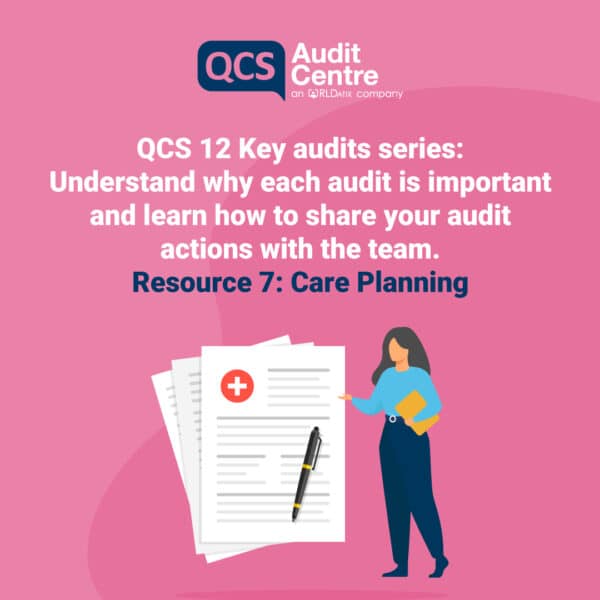Why do we need to complete audits?
To achieve good governance in your service you must demonstrate continuous quality improvement. To do this, auditing and documenting the effectiveness of the processes and systems you have in place, and taking time to observe and document how people experience your service, is essential.
Audits and completed action plans offer evidence of the great care you provide. Where improvements are needed, they allow you to demonstrate openly and clearly how you plan to make the changes required that you have identified.
Care Planning: the case for auditing
Auditing care plans will help you identify areas that you cover well, while documenting the desired care provision, as well as any areas that require improvement. An audit will provide assurance that you tackle all the essential and varied areas of compiling and reviewing care planning, ensuring your planned, person-centred care delivery.
A robust auditing process will assist you in identifying key aspects of care planning and show that your team have the information available to ensure that they provide a bespoke, person-centred service.
- Audits monitor that the correct information is gathered and logged
- Audits are a good method for ensuring documentation reflects the care delivery
- An audit can confirm that service user consent is obtained every step of the way
- Audits are essential for monitoring the care plan review process
- Audits support and identify key areas of improvement
The audit process will assist you in delivering the desired care and support to your service users. This should be an integral part of your compliance and good governance strategy. The audit process is an evidenced based method of ensuring you complete your quality assurance and that as a provider you take steps to confirm your compliance. It should be an integral part of your organisational culture and not merely viewed as a time-consuming paper exercise. As providers we have a duty of care to ensure that we internally regulate our service, by completing regular audits and embedding the process throughout the organisation, you will ensure that auditing is both valuable and meaningful.
Care Planning Auditing: achieving compliance
Audits enable you to provide valid, up to date evidence to the CQC that you are managing the Care Planning Audit process effectively and meeting the required regulations such as:
- Regulation 9: Person-centred care
- Regulation 10: Dignity and respect
- Regulation 11: Need for Consent
- Regulation 14: Meeting nutritional and hydration needs
- Regulation 17: Good governance
Findings: what does the care planning audit tell you?
Example 1:
An audit revealed multiple service users that had not received a formal review, as a provider you should:
- Review your chosen method for arranging reviews to ensure it is clear and being used correctly
- Review staff workload and redistribute if necessary
- Provide support and training to staff to ensure they understand the importance of timely reviews
Example 2:
Your care planning audit revealed that there were no goals included for service users, as a provider you should:
- Review your training and support program for staff to ensure that they understand why having goals is an essential component for person centred care
- Create a realistic deadline where this information is gathered and included on the care plans
So, what happens next?
Effective auditing can encourage providers and staff to have confidence in your processes and in turn foster an open and transparent culture where staff feel comfortable reporting incidents and near misses, especially if this is part of a no blame culture.
But it does not stop once the audit is complete. Your good governance systems then take over creating an environment where learning and improvement thrive, benefiting the safety and well-being of those receiving care and support.
Once you have had a chance to review your audits you can then if needed:
- Allocate resources
- Implement prevention measures
- Increase/implement/refresh staff training
- Consider environmental changes
- Consider the use of assistive devices
- Share the findings and actions with the team




